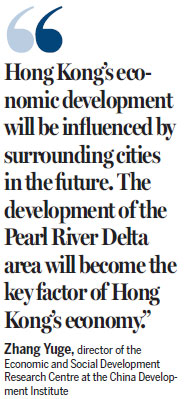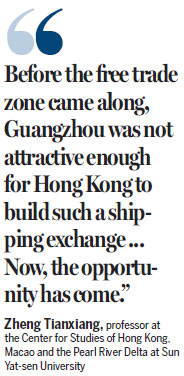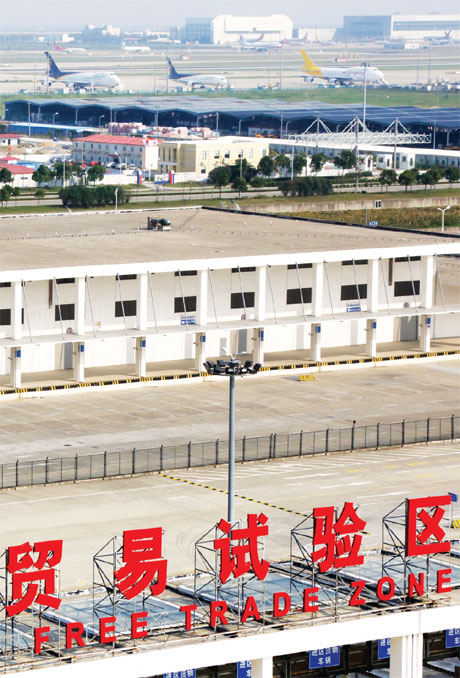Guangdong FTZ to spark win-win scenario for HK
Updated: 2015-02-04 07:47
By Chai Hua in Shenzhen(HK Edition)
|
|||||||
|
The new free trade zone can help Hong Kong integrate further with Pearl River Delta cities to penetrate the mainland market. Tomohiro Ohsumi / Bloomberg |
The proposed Guangdong Free Trade Zone (FTZ) will strive to promote the province's cooperation with Hong Kong and Macao, according to a regulation draft released in January by the Legislative Affairs Office of Guangdong Provincial Government in a move expected to give the Hong Kong economy a boost.
The Guangdong FTZ will help Hong Kong further develop the economic hinterland of its service industry and create more opportunities for professionals and youth in the SAR, said Chen Guanghan, professor of Economics and director of the Center for Studies of Hong Kong, Macao and Pearl River Delta at Sun Yat-sen University, Guangzhou.
"The influence of the FTZ's policy will double after its service industry liberalization agreement with Hong Kong," Chen told China Daily.
That agreement, signed at the end of last year, offers most Hong Kong service providers the same treatment as companies from the Chinese mainland when they start doing business in Guangdong.

Zhang Yuge, director of the Economic and Social Development Research Centre at the China Development Institute, a Shenzhen-based thinktank, told China Daily: "The cooperation is actually an integrative economic development."
To deepen such cooperation, the draft agreement says Guangdong FTZ will further open up to Hong Kong and Macao investors under the framework of CEPA (Closer Economic Partnership Arrangement).
"Hong Kong's economic development will be influenced by surrounding cities in the future," Zhang said. "The development of the Pearl River Delta area will become the key factor of Hong Kong's economy."
The draft says that the FTZ will cancel or relax access restrictions on Hong Kong and Macao investors, including qualification requirements, shares proportion and scope of business, with a focus on financial, trading, professional and scientific services industries.
Zhang said: "Such policy is equivalent to a gradual implementation of national treatment to Hong Kong-invested companies in the FTZ. This is an important opportunity for Hong Kong people and enterprises to enter the mainland market."
Meanwhile, the FTZ will also implement the management model of "negative list" approach to foreign investment, the work mechanism of "one-form application and one-stop acceptance", and convenient customs supervision services similar to the Shanghai Pilot FTZ.
The draft represents a breakthrough in attracting more Hong Kong talents in its provision for personnel qualification recognition or unilateral recognition, said Zhang, as cross-border complete qualification recognition is very difficult to realize because of the difference in laws. "Hong Kong talents will have a greater market to develop if the policy can be put into practice," he added.
Finance and international shipping industries are the main areas of the FTZ's cooperation with Hong Kong and Macao, according to the draft.
The FTZ also encourages mainland companies seeking to go global to rely on the two SARs' advantages in financial services and information industries, as well as international trade network and risk management.
The draft says the FTZ will promote the renminbi as the main currency of large-sum cross-border trading and investment settlement. It will also allow Hong Kong finance institutes of different levels, types and functions to establish their business in the FTZ.
Li Daxiao, director of Shenzhen-based brokerage Yingda Securities, said: "The innovative financing policies will gather a large number of enterprises in the zone, bringing high business efficiency."
As for international shipping, the draft says Guangdong, Hong Kong and Macao should cooperate to establish a logistics hub of the 21st Century Maritime Silk Road.
The FTZ will further open up to overseas investment in the area of shipping management, maritime shipping, air transportation and shipping finance. As an international maritime center, its shipping industry and maritime services are of crucial importance to Hong Kong's economic development as a whole. However, it faces challenges posed by neighboring Singapore and Shanghai.
According to a Hong Kong Trade Development Council (HKTDC) report, the rise of ship owners and shipyards on the mainland will undoubtedly bring business opportunities to the shipping industry of Hong Kong.
The benefits are expected to expand further as the SAR's surrounding cities are all in the midst of great efforts to build shipping exchange centers.

HKTDC's latest New Bridge and Pearl River Delta (PRD) West report says ways to leverage the advantages of Zhuhai and Hong Kong and further develop their function as regional distribution centers, including the western PRD's warehousing functions as Hong Kong's back-end logistics industry base, are opportunities worthy of further exploration.
Nansha district in Guangdong's provincial capital of Guangzhou is also making an effort to develop its shipping industry. "Before the FTZ came along, Guangzhou was not attractive enough for Hong Kong to build such a shipping exchange," said Zheng Tianxiang, professor at the Center for Studies of Hong Kong, Macao and the Pearl River Delta at Sun Yat-sen University. "Now, the opportunity has come."
Zheng speculates that free travel of yachts and cruise ships between Nansha and the SAR will be allowed, bringing more bilateral exchanges and trade.
As a forerunner of the cooperation with Hong Kong, the Qianhai Shenzhen-Hong Kong Modern Service Industry Cooperation believes it has a unique advantage.
"We are studying and developing ways to build Qianhai as the core of the Guangdong FTZ," said Zhang Bei, director of the Qianhai administration.
The National People's Congress in December announced that new FTZs will be opened in Guangdong province, Fujian province and Tianjin Municipality, based on the successful model of the Shanghai Pilot FTZ.
The Guangdong FTZ, expected to be formally established at the end of February, consists of Shenzhen's Qianhai and Shekou, Zhuhai's Hengqin and Guangzhou's Nansha, plus Guangzhou's Baiyun Airport Comprehensive Bonded Zone.
grace@chinadailyhk.com
(HK Edition 02/04/2015 page8)
